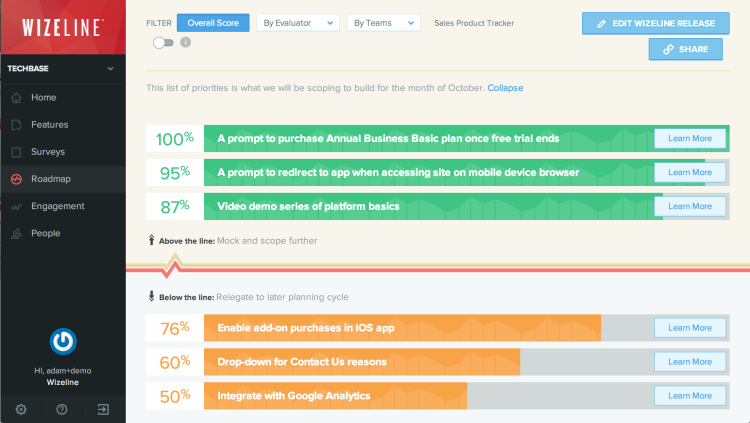Sixty percent of R&D budgets are wasted on features that are never used. That’s the inefficiency startup Wizeline — which grabbed $6.7 million last week — intends to disrupt with data.
The Series A funding, representing the total amount the company has received thus far, was raised from Lowercase Capital, Bowery Capital, Sierra Ventures, and A Capital, and will be used to scale sales and marketing for its product development intelligence platform.
“We’re trying to build the corporate brain [by creating] a platform that has a view into all data,” CEO/founder Bismarck Lepe told VentureBeat. Previously, Lepe co-founded enterprise video platform Ooyala.
“Product strategy is the last frontier for software-as-a-service,” he said. Much of the feedback used in product development, he added, is still being tracked in spreadsheets and emails that “lead to flawed decision-making and tremendous waste.”
Wizeline, founded in November of last year, launched its platform in April. It captures feature requests, team knowledge, new ideas, Salesforce-derived data, feedback from customer service, and other information. To keep responses to the feature requests within bounds, the system has customizable constraints, such as cost estimates for engineering or business guidelines.
Recommended features are ranked by priority. Users can vote recommended features up or down, and the roadmap can be modified before exporting it to project tracking and management software. Machine learning helps assesses the decisions made, Lepe said, “and product usage engagement [is used] as a proxy for value.”
Data capture and analysis continues after product release, from such sources as customer engagement data, Zendesk customer service, or Google Analytics. The company said no data is sold or shared between companies.
One use case: Australian media conglomerate Fairfax Media wanted to iterate its video platform. Before Wizeline, Lepe said, it took them 18 months the first time and one year the second time to complete a new version. The third iteration, with Wizeline, “took two weeks.” He added that Wizeline was able to recommend that, for instance, features be improved to target iPad users, since data showed there was double-digit usage on that device.
“Because it was already on the market,” he said, “we could use the engagement data and the feature usage.”
Lepe told us that Wizeline’s centralization of data, prioritization, and tracking helps it stand apart. While the system can inform new product development – by “identifying signals [that could lead] to a new idea,” Lepe said – its emphasis is on “the evolution of existing products.”
Currently, the company reports about 350 large and small companies on the platform.
Lepe said the platform’s competitors are, on the low end, project management tools that capture some feedback; on the high end, they are consulting companies that rely on human expertise.
But “we believe we’re creating a category in a space that hasn’t been experimented with,” he told us.
The company is also using its platform to guide its own improvement, such as improving transparency for executives after salespeople reported that need.
In other words, to use a common phrase, the company is eating its own dog food.
VentureBeat's mission is to be a digital town square for technical decision-makers to gain knowledge about transformative enterprise technology and transact. Learn More

